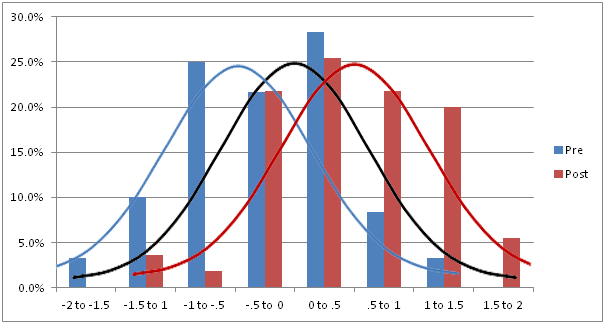
The Mathematical Knowledge for Teaching (MKT) survey results from the first two cohorts of Primarily Math show that the Primarily Math program is having a large effect on teachers' mathematical knowledge for teaching. When teachers enter the program their scores are comparable to those of K-3 teachers nationwide, but when they leave the program, their scores are significantly higher.
NebraskaMATH uses the MKT assessment as part of its assessment of the Primarily Math program. The MKT measures K-6 teachers' knowledge of mathematics as it relates to teaching elementary math. The items include questions about teaching knowledge, such as choosing the best examples or representations to illustrate specific mathematical ideas, and items that ask teachers to interpret examples of student thinking. Scores on the MKT are reported as standardized scores, with a mean of 0 and standard deviation of 1 as compared with a large national sample of K-6 teachers.
The K-3 teachers in Primarily Math take this survey before and after taking Primarily Math courses, as well as one year afterward. Since our first cohort began in 2009, cohort 1 teachers took the MKT in 2009 (pre), 2010 (post), and 2011 (follow-up); cohort 2 teachers took the MKT in 2009 and 2010 (pre), and 2011 (post).
Combining cohorts 1 and 2 pre- and post/follow-up survey scores, we see tremendous growth, especially when compared to the national norm for K-6 teachers (the solid black line in the figure shown).
While the national sample for the MKT is for K-6 teachers, the MKT creators have recent data showing K-3 teachers are expected to have lower scores than the overall scores for the K-6 population. Since our participants are K-3 teachers, it does not surprise us that prior to enrollment in the Primarily Math program their mean score (mean -0.28, standard deviation 0.69) was below the national average for K-6 teachers. However, after Primarily Math, our K-3 teachers’ mean score is above the national average at 0.47 (with standard deviation 0.70), representing a gain of three-quarters of a standard deviation. While only 16 percent of all K-6 teachers nationwide score above 1.0 (1 standard deviation above the mean), 26 percent of the K-3 teachers who have completed Primarily Math score in that range.
Prior to Primarily Math, 60 percent of the teachers’ scores were below the national average for K-6 teachers (note that 50 percent below the mean is expected). After completion of the program, only 27 percent of our K-3 teachers scored below the national mean, even without the representation of fourth to sixth grade teachers. Of the 27 percent below the mean, only one-fourth of the K-3 teachers are more than 0.3 standard deviations below the national mean (in other words, they are quite close to the national average for K-6 teachers).
This tells us the Primarily Math program is having a large effect on teachers' mathematical knowledge for teaching. Our analyses of student data are ongoing, to allow us to detect whether these large improvements in teacher knowledge are translating to comparable improvements in student success in mathematics.
The good news is that Primarily Math is still accepting applications through Jan. 16, 2012, for teachers to begin the professional development program in June 2012. Please spread the word to your colleagues about the tremendous opportunity available to them through Primarily Math: 18 hours of graduate credit free across 18 months.
In this era of high-stakes testing, it is more important than ever that students develop strong mathematical foundations. Primarily Math helps teachers develop the expertise to support strong student learning. Applications are accepted online only: https://cse.unl.edu/~scimath/apps/apply.php
If you are interested in helping us offer the Primarily Math courses to more teachers at no cost to them, please donate now to the University Foundation's Math and Science Teachers for the 21st Century Fund. Any amount is appreciated and can help fund more opportunities for teachers.
More details at: http://go.unl.edu/0km